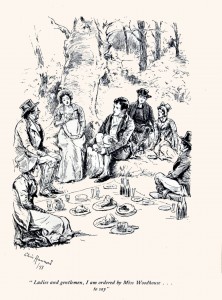Well, folks, this week I’m disheartened by the state of etymology in dictionaries. Again, I’ve found a term that has a date of origin in Merriam-Webster that is far from actuality. Yes, I’m emailing them with the citation as I did last week with “water down.” We’ll see if any changes occur. If I keep this up, I’m sure they’ll have me on some sort of blacklist for nerds and pedants.
The word in question? Here you are–
Mouthwatering or Mouth-watering–Let’s start with what bugs me. Merriam-Webster lists this word, meaning appetizing, as originating in 1900. Big nope. I came across the term in A New and Literal Translation of Juvenal and Persius by Rev. M. Maddan (1789). In the explanation of “mercurial spittle,” Maddan says:
Mercury was the god of gain: hence a desire of gain is called saliva mercurialis. Metaph. from gluttons, who, at beholding some dainty dish, have their spittle increase in such a manner, as that, if they did not swallow it, it would run out of the mouth. This we call–the mouth watering. Can you sec money without your mouth watering at it?–ie without being greatly delighted and coveting it?
That looks pretty much like the same definition as we use today. Not convinced? In The British Encyclopedia: Or Dictionary of the Arts and Sciences, Vol. 5 from 1809, we have this snippet written under the entry for “physiology”:
When any acrid matter is taken into the mouth, an increased flow of saliva is produced; and this may also follow the mere sight of food, and hence has arisen the well-known expression of the “mouth watering.” [emph. added]
And, for a more famous person’s use of the term, William Wilberforce in an 1809 letter stated, “I must own that from my earliest days, at least my earliest travelling days, I never passed a parsonage in at all a pretty village, without my mouth watering to reside in it.”
For added fun, here it is in A Dictionary of the Chinese Language (1815):
So, my Regency writers, feel free to use “mouthwatering” without hesitation–you can even use it in Chinese.


